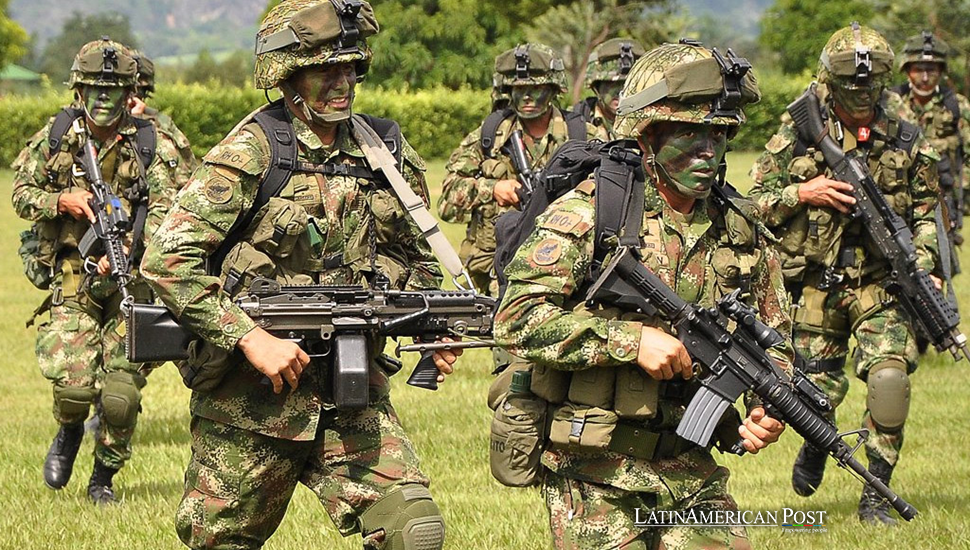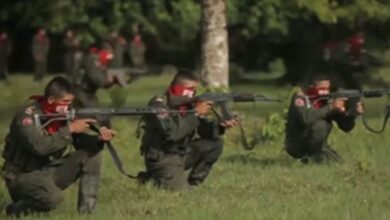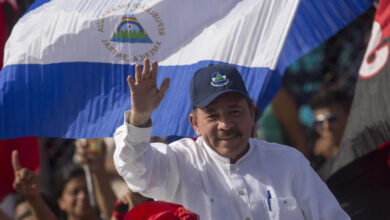Colombia’s Tough Tactics Pave the Way to Peace

Colombia’s peace process is in a precarious state, with recent military operations against the ELN, resulting in fatalities, captures, and the recovery of weapons, underscoring the gravity of the situation. These actions, while controversial, may be the only path to lasting peace, highlighting the difficult choices facing the country.
A Nation Caught Between Peace Talks and Violence
Colombia has long grappled with the challenge of negotiating peace while combating armed groups that refuse to disarm. Recent clashes between the Colombian Armed Forces and the National Liberation Army (ELN) in Bolívar and Arauca illustrate the precariousness of the situation. The Colombian Armed Forces, tasked with maintaining security and protecting civilians, have been at the forefront of these operations. In Bolívar, their police operations resulted in the deaths of seven ELN members, the capture of seven others—including three minors—and the recovery of 15 firearms, computers, and other materials. Tragically, these operations also claimed the life of Police Lieutenant Jorge Humberto Muñoz and left three officers injured.
In Arauca, military forces confronted ELN fighters linked to a deadly September attack. The Arauca operations, resulting in six guerrilla deaths, five captures (including a minor), and the rescue of a kidnapped civilian, underscore the delicate balance Colombia must maintain between military action and its peace ambitions.
The ELN and Its Impact on Colombia’s Stability
The ELN, a Marxist guerrilla group with deep roots in Colombia’s half-century-long armed conflict, has proven a persistent obstacle to peace. Despite ongoing negotiations initiated in 2022, the group continues to engage in kidnappings, extortion, and attacks on critical infrastructure. The suspension of a temporary ceasefire in August 2023 marked a turning point, with violence surging in regions like Arauca and Bolívar.
The Colombian government’s decision to suspend peace talks after the September attack in Arauca highlighted a critical dilemma: how can peace negotiations succeed when one party continues its campaign of terror? General William René Salamanca, head of the Colombian National Police, has vowed to dismantle ELN operations entirely, emphasizing the need to protect communities affected by the group’s activities.
Tough Choices in Pursuit of Lasting Peace
Critics argue that military operations undermine peace efforts, but others contend that such actions may only pressure groups like the ELN to negotiate in good faith. The recent offensives illustrate the dual role of Colombia’s armed forces: dismantling guerrilla networks while protecting civilians caught in the crossfire.
The complexity of the situation is evident in Bolívar and Arauca, where minors were found among the captured ELN members, raising questions about the group’s recruitment practices. By targeting key ELN strongholds and leadership, the government aims to weaken the group’s capacity to wage war. These operations could potentially disrupt the ELN’s leadership structure and reduce their ability to carry out attacks. However, this approach carries significant risks, including civilian casualties and the potential alienation of communities in conflict zones.
Can Peace Be Salvaged?
Colombia’s peace process cannot succeed without addressing the root causes of the conflict, including inequality, land disputes, and weak state presence in rural areas. Yet, the government’s recent actions demonstrate its unwillingness to tolerate violence as a bargaining tool. Colombia seeks to create conditions conducive to meaningful dialogue by targeting the ELN’s operational capacities.
However, the government must balance its military strategy with initiatives addressing social and economic grievances. Strengthening infrastructure, expanding educational opportunities, and fostering community resilience are not just beneficial, but essential to achieving sustainable peace. The recent operations also highlight the need for reintegration programs and support for victims of violence.
A Difficult but Necessary Path
Colombia’s recent actions against the ELN are controversial but may be necessary to restore credibility to the peace process. While military operations alone cannot resolve the country’s deep-seated issues, they can weaken groups that perpetuate violence and pave the way for dialogue.
Also read: Tom Homan’s Hardline Approach and Immigration Effects in Latin America
The road to peace is fraught with challenges, but Colombia’s determination to protect its citizens and dismantle armed groups is a step toward a more stable future. The nation may finally achieve its sought-after peace by combining forces with social reforms.




